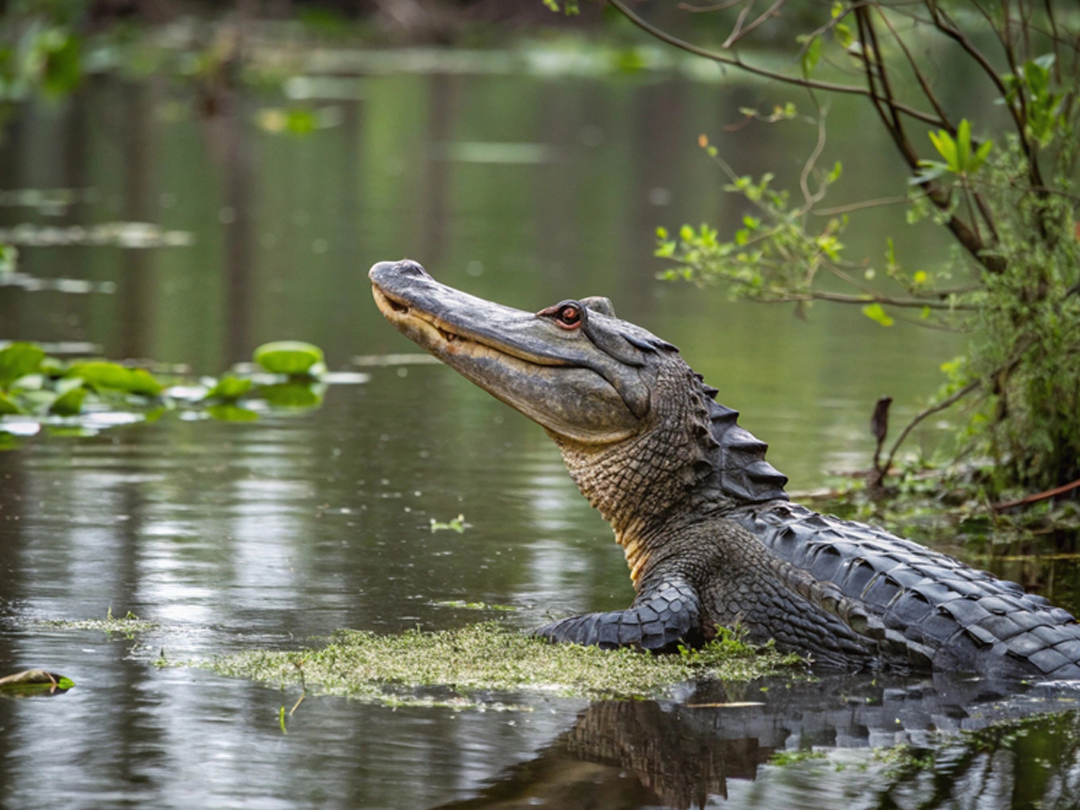How Alligator Hunting Helps The Environment: Responsible Population Management

Alligator hunting plays an important role in maintaining the health of ecosystems, especially in regions like Florida, where alligator populations are abundant. With overpopulation being a real concern in certain habitats, ethical and regulated hunting practices help balance alligator numbers and protect both their species and other wildlife.
We will discuss how alligator hunting contributes to the environment, the significance of population control, and the benefits it brings to the natural world.
Population Control and Habitat Health
The primary environmental benefit of alligator hunting is population control. Alligators are apex predators that help regulate the populations of various species within their habitat. However, when their numbers grow unchecked, they can disrupt ecosystems, depleting resources for other species.
Responsible hunting sees to it that alligator populations remain sustainable, which in turn supports the broader biodiversity in wetlands and other habitats.
By preventing overpopulation, alligator hunting helps avoid the negative impact on vegetation and the animals that rely on these ecosystems. The removal of certain alligators through regulated hunting allows plants, fish, and smaller animals to thrive.
Additionally, it helps maintain a healthy balance between predators and prey, which is vital for the stability of any ecosystem.
The Role of Alligators in the Environment
Alligators, while being formidable predators, also play a beneficial role in the ecosystem. They help maintain the balance of aquatic life by controlling fish and amphibian populations. Their nests and dens create habitats for other animals, such as turtles, birds, and fish.
Alligator hunting, when done responsibly, can help prevent overcrowding and ensure that these beneficial roles are continued without the detrimental effects of overpopulation.
In wetland ecosystems, alligators create "alligator holes"—deep water areas that bring refuge for many species during dry periods. These as small reservoirs that support fish, aquatic plants, and other wildlife, particularly during seasonal droughts. By managing alligator populations through hunting, we help protect these important environmental features.
Regulated Hunting and Conservation Funding
Regulated hunting, including alligator hunts, generates significant funds for conservation efforts. Taxes on hunting equipment and licenses contribute to wildlife preservation programs, which directly benefit ecosystems.
In Florida, the funds raised through alligator hunting permits support the conservation of wetlands and other significant habitats for a variety of species.
The government’s management of alligator hunting also includes strict rules that dictate when and how hunting is allowed.
These regulations help so that hunting activities do not exceed the biological limits of the population, which is important for maintaining long-term environmental health. Without such regulations, overhunting could lead to population imbalances and environmental degradation.
Balancing Ecosystem Dynamics
Alligator hunting helps maintain the dynamic balance between species in wetlands and freshwater systems. Alligators themselves are not the only species affected by overpopulation; numerous smaller creatures depend on the stability of these environments. When the number of alligators is kept in check, the entire food web benefits.
Predators like alligators are needed for maintaining the health of prey populations. However, too many alligators can result in the depletion of certain species, disturbing the ecological equilibrium. Regulated hunting allows alligators to remain a necessary part of the ecosystem while minimizing any negative impacts on other wildlife.
Florida Alligator Hunting as a Sustainable Practice
Florida has established itself as a leader in sustainable alligator hunting practices. With a well-organized management system, the state makes it a point that hunting seasons are aligned with the reproductive cycles of alligators to avoid hunting during their breeding periods.
By carefully controlling hunting quotas and areas, Florida supports a sustainable and balanced environment for alligator populations.
Furthermore, Florida alligator hunting helps control the spread of invasive species that threaten the delicate ecosystems. For instance, by managing the numbers of alligators in certain regions, other native species have the opportunity to flourish, and ecosystems remain balanced. Sustainable hunting practices are an integral part of environmental stewardship in the state.
The Ecological Impact of Overpopulated Alligator Species
When alligator populations become too large, their predatory behavior can disrupt the balance of prey species. Alligators primarily feed on fish, small mammals, and birds, but in large numbers, they can deplete these populations, leading to declines in certain species.
This imbalance can also affect plant life, particularly in wetland areas, as these areas may be overgrazed by other species that become more abundant due to the lack of natural predators.
Responsible hunting helps limit this imbalance by removing a portion of the alligator population while allowing the ecosystem to function more naturally. When populations remain at manageable levels, alligator hunting can contribute to the health of aquatic and terrestrial species that rely on the same habitats.
Ethical Considerations in Alligator Hunting
Ethical alligator hunting prioritizes both animal welfare and environmental health. Hunters are required to follow specific regulations that aim for humane and sustainable hunting practices. These regulations help maintain the integrity of alligator populations so that hunting remains a controlled activity rather than an exploitative one.
Moreover, the meat and hide from harvested alligators are often used in a variety of ways, promoting full utilization of the animal rather than waste. This practice encourages sustainable hunting and offers economic benefits, contributing to the local economy while benefiting the environment.
Educating the Public on Alligator Conservation
Public education plays a vital role in the success of alligator conservation efforts. By raising awareness about the importance of responsible hunting and population control, wildlife organizations can engage the public in the conservation process.
The more people understand how alligator hunting helps the environment, the more they can contribute to supporting sustainable practices and wildlife protection initiatives.
Efforts to educate the public also help dispel myths about alligators, focusing on the positive role they play in ecosystems and the necessity of population management. Well-informed citizens are more likely to support conservation funding and participate in efforts to protect alligator habitats.
Alligator Hunting and Economic Impact
The economic benefits of regulated alligator hunting extend beyond the sale of hunting licenses. Tourism related to alligator hunting brings in millions of dollars annually, supporting local economies in regions where these hunts take place.
In Florida, many hunters travel specifically for alligator hunting, contributing to local businesses and the state’s economy.
Additionally, revenue generated from hunting and conservation programs helps fund further research into the protection and sustainable management of wildlife populations. This cycle of funding, research, and responsible hunting makes the environment and economy thrive together.
The Role of Alligator Hunting in Preventing Human-Wildlife Conflicts
As alligator populations grow, they sometimes venture into populated areas, leading to human-wildlife conflicts. Alligator hunting helps prevent such conflicts by removing individuals that may pose a threat to human safety.
This management strategy sees to it that alligators remain in their natural habitats, minimizing the risks posed by human-alligator encounters.
Moreover, removing problem alligators helps prevent the spread of diseases that could affect both wildlife and humans. By maintaining healthy, controlled alligator populations, hunting helps protect both people and animals.
Challenges in Managing Alligator Populations
Despite the benefits, managing alligator populations is not without its challenges. One of the primary concerns is making sure that hunting is done in a way that is truly sustainable. If hunting practices are too lax or improperly regulated, overhunting can occur, leading to long-term damage to the ecosystem.
Furthermore, climate change and habitat destruction can affect alligator populations in unexpected ways. As sea levels rise and wetland habitats are threatened, alligator populations may shift, and management strategies must adapt to these changes.
A Regulated Future for Alligator Hunting
Looking ahead, the future of alligator hunting will depend on continued regulation and research. As environmental challenges grow, it is vital that alligator hunting practices evolve to meet the demands of wildlife management.
Collaborative efforts between government agencies, conservation groups, and hunters will be necessary so that alligator hunting remains a tool for environmental preservation.
With the help of regulated hunting, we can maintain balanced ecosystems where both humans and wildlife can coexist. It is up to all involved to stay vigilant and committed to sustainable hunting practices.
The Importance of Alligator Hunting in Preserving Wetland Ecosystems
Alligators play a vital role in shaping wetland ecosystems by creating "alligator holes," which are deep water areas that offer refuge for various species, especially during dry periods. These holes serve as vital habitats for fish, amphibians, and other aquatic species that would otherwise struggle to survive in harsh conditions.
However, when alligator populations grow unchecked, these habitats can become overcrowded, leading to a depletion of resources.
Regulated alligator hunting helps maintain a balanced population, preventing the overuse of wetland resources. By keeping the alligator population at a sustainable level, hunting allows the ecosystems to thrive and supports a variety of other species that depend on these wetlands.
This careful population control makes sure that wetlands continue to bring their basic ecological functions, such as water filtration and flood mitigation.
Book Your Hunt with Trophy Gator Hunts
Trophy Gator Hunts offers professional, ethical alligator hunting experiences throughout Florida. We invite you to book our Florida alligator hunts for an unforgettable adventure. With over 30 years of experience, we guarantee 100% success and a safe, enjoyable hunt. Schedule your hunt with us today and be a part of responsible wildlife management.

